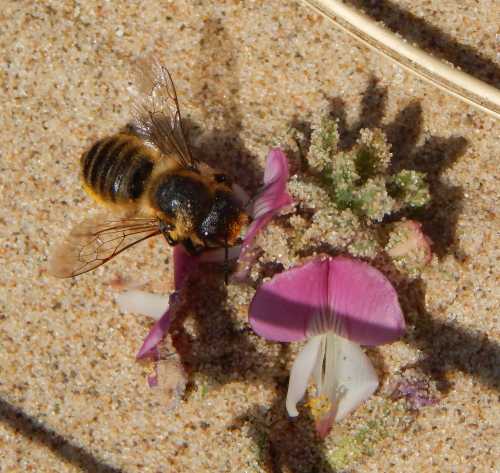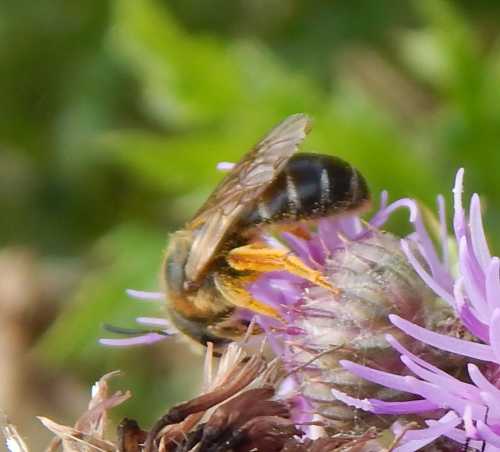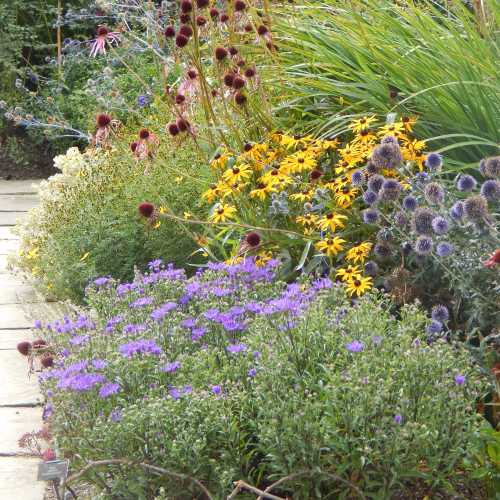Help The Bees
By Bee-ing The Change You Wish To See In The World
We can all do our bit to help the bees (and here, I’m talking about all types of bees, including those unsung heroes of the pollinating world: solitary and bumble bees, as well as honey bees).
Helping bees starts with awareness followed by practical action within our own means. Of course, we instinctively know what’s good for bees and what is not.
We know bees need habitat, including nest sites and nectar and pollen rich plants for food. They need to forage without being exposed to insecticides.
A large part of this website highlights how the two issues above are
causing problems for bees (and indeed, other pollinators and invertebrates generally).
Habitat decline is worrying, and is being lost to development, farming and land management practice, and even gardening trends - although increasingly, I am pleased to see that work is being done to reverse these trends - gardeners are including plants for bees and some government bodies and councils are creating more pollinator verges.
 Coastal Leafcutter Bee - Megachile maritima - female - foraging on restharrow.
Coastal Leafcutter Bee - Megachile maritima - female - foraging on restharrow.
The
use of pesticides is of real concern. They are not only used on
farmland to grow crops, they are also used (sometimes preventatively –
how crazy is that?) on lawns, golf courses, and may even be present within
commercially grown pot plants you buy from the garden centre. Then of course, there are the garden
pesticides, and those spread by local councils.
However, if we really want change, then it starts with you and me.
Be the change you wish to see in the world
 Orange-legged furrow bee - Halictus rubicundus (female) on slender thistle - Carduus tenuiflorus.
Orange-legged furrow bee - Halictus rubicundus (female) on slender thistle - Carduus tenuiflorus.I like to think of it in terms of bee-ing the change.......
Although I started out as a committed campaigner back in 2008, these days with a huge amount of work and creating pressure to create regulatory change, I started focusing a lot more on the positive, practical steps the general public can take to help the bees.
How can YOU help the bees?
- Helping bees is not rocket science. You can start with these
top 10 tips
to help the bees. Collectively, a big difference can be made.
-
If possible, grow your own
organic produce (it's cheap and easy). If you haven't got around to
this (and believe me, some produce can be grown in pots on a balcony),
then buy organic - or at least some organic produce if you can. See my page:
Eating Organic.
- Communicate with local councils and politicians - ask them to create pollinator verges and consider bees and pollinators in the creation of public planting schemes. More information about how councils can help the bees here. I also think it's a very good idea to give positive feedback when councils and politicians genuinely take helpful action.
- If you have plants for bees in your garden that can easily be divided or shared, pass them on to friends, neighbours, schools, gardening clubs or whoever would be interested in receiving them. You never know you may receive a few plants in return!
Final words...
I have come across campaigners who spend a lot of time telling other people and government what actions they must take, whilst not following their own advice themselves. If I did not try my best to help the bees in my own garden, I'd be a hypocrite as far as I'm concerned.
The fact is that if we want to help the bees, it really is WE PEOPLE who have the power to create the change that will help them - and it starts by doing what we can in our own gardens and in our own communities.
FREE PDF DOWNLOAD:
Planning And Planting A Bee Friendly Garden
If you found this page helpful or interesting, I'd really be grateful if you would share it with others - if not this page, perhaps another, such as Gardening For Bees.
Thank you so much :) .
